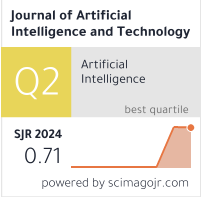Optimization of Test Path for Microfluidic Biochip Design Using Genetic Algorithm Combined with Particle Swarm Optimization Algorithm
DOI:
https://doi.org/10.37965/jait.2025.0721Keywords:
genetic algorithm, microfluidic biochip, particle swarm algorithm, priority strategy, test pathAbstract
To enhance the efficiency and precision of microfluidic biochip testing, this study proposes a hybrid optimization model integrating genetic algorithm (GA) and particle swarm optimization (PSO) with a dynamic priority strategy. Traditional methods, such as the ant colony algorithm and Euler loop method, often suffer from slow convergence or local optima in complex path optimization scenarios. By combining the global exploration capability of GA and the local exploitation strength of PSO, the proposed GA-PSO algorithm dynamically adjusts search priorities to minimize interference between experimental and test droplets. This approach optimizes test paths for both offline and online testing modes. Experiments on chips ranging from 7 × 7 to 15 × 15 arrays demonstrate significant improvements: the 15 × 15 chip achieves a shortest path length of 442 in both modes, reducing iterations by 60.9% for offline and 16.9% for online testing compared to standalone GA or PSO. Compared to the ant colony algorithm and Euler loop method, the proposed method shortens offline test paths by 4.91% and 5.56%, respectively, and online test paths by 8.98% and 9.80%. Key contributions include (1) a novel hybrid algorithm balancing global and local search, (2) a dynamic priority strategy mitigating droplet interference, and (3) a universal framework applicable to diverse chip specifications. These advancements offer practical guidance for real-time detection and batch processing in biomedical engineering, significantly improving testing efficiency.
Published
How to Cite
Issue
Section
License
Copyright (c) 2025 Authors

This work is licensed under a Creative Commons Attribution 4.0 International License.





